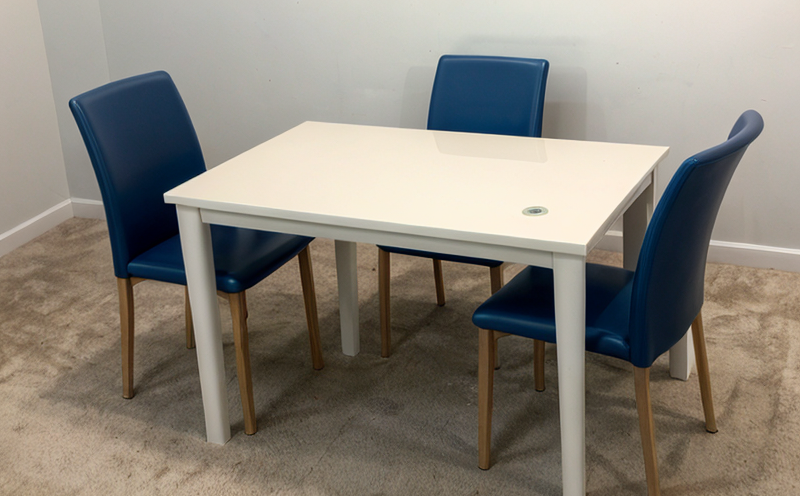ASTM D696 Coefficient of Thermal Expansion Testing of Furniture Plastics
The ASTM D696 standard specifies the procedure for testing the coefficient of thermal expansion (CTE) of plastics, including those used in furniture. This test is crucial because it helps manufacturers understand how a plastic material will behave under varying temperatures during manufacturing, assembly, and usage conditions.
The CTE measures the fractional change in length per degree temperature change. For furniture plastics, accurate knowledge of this parameter ensures that parts and assemblies do not suffer from excessive thermal stresses leading to potential failures or deformation over time. This standard is widely used across various sectors where thermoplastics are involved; these include automotive interiors, electronics enclosures, appliances, and obviously, furniture.
The test involves subjecting a specimen to controlled heating and cooling cycles while measuring its dimensions using highly accurate instruments like optical interferometers or laser displacement sensors. The change in length is then calculated relative to the initial dimension at room temperature. This method provides precise data on how much expansion or contraction occurs within specific temperature ranges relevant for the application.
Understanding CTE values allows manufacturers to select appropriate materials based not only on their mechanical properties but also their thermal performance characteristics. By incorporating this knowledge into design and manufacturing processes, companies can enhance product durability, reduce warranty claims due to defects related to temperature variations, and improve overall customer satisfaction.
The ASTM D696 test is particularly important in the furniture industry because many modern pieces incorporate plastics that serve both structural and aesthetic purposes. These parts may experience significant temperature fluctuations throughout their lifecycle—such as during manufacturing processes or when exposed to sunlight through windows. Accurate measurement of CTE helps designers predict these effects accurately, ensuring better performance over extended periods.
It's worth noting that while this standard focuses primarily on thermoplastics like polypropylene (PP), polystyrene (PS), and acrylonitrile butadiene styrene (ABS), it can also be applied to other types of plastics commonly used in furniture manufacturing. However, due to differences in material properties among various polymers, slight modifications might be necessary during testing.
To summarize, the ASTM D696 CTE test is essential for ensuring that plastic components in furniture meet quality standards regarding their thermal stability and longevity. By providing detailed information about how a particular polymer responds to temperature changes, this standard empowers manufacturers to make informed decisions about material selection and design optimization.
Industry Applications
ASTM D696 Coefficient of Thermal Expansion Testing finds extensive application across multiple industries where thermoplastics are utilized:
- Furniture Manufacturing: Ensuring that plastic parts used in chairs, tables, and other furnishings remain stable under varying environmental conditions.
- Automotive Interior Components: Monitoring changes in shape or size of plastics used inside vehicles to maintain fit and functionality over time.
- Consumer Electronics: Evaluating the impact of temperature variations on electronic enclosures made from plastic materials.
| Industry | Key Considerations |
|---|---|
| Furniture Manufacturing | Ensuring durability and preventing warping or cracking of parts exposed to temperature fluctuations. |
| Automotive Interior Components | Maintaining structural integrity during extreme temperatures encountered in vehicles. |
| Consumer Electronics | Preserving the fit and finish of enclosures that could otherwise deteriorate due to thermal expansion. |
International Acceptance and Recognition
The ASTM D696 standard for Coefficient of Thermal Expansion Testing enjoys broad international recognition, being adopted by numerous countries as a benchmark measure for quality assurance in the plastics industry. It is referenced in several national standards bodies such as BSI, AS/NZS, and others.
Many organizations worldwide rely on ASTM D696 results to ensure compliance with international regulations governing the use of thermoplastics in products. For instance, it is often cited by regulatory agencies like the European Union's Reach Regulation or the U.S. Consumer Product Safety Commission (CPSC) when assessing the safety and durability of consumer goods containing plastic components.
Given its global acceptance, manufacturers who adhere to ASTM D696 gain access to larger markets while also enhancing their reputation for producing high-quality products. This standard not only promotes consistency but also fosters innovation by encouraging continuous improvement in material performance.
Use Cases and Application Examples
The ASTM D696 test is particularly relevant when designing furniture that includes plastic components subjected to prolonged exposure to fluctuating temperatures. For example:
- Fabricated Office Chairs: These often feature injection-molded armrests or backs made from polypropylene, which could warp if not properly tested for CTE.
- Lounge Furniture: Pieces with complex geometries like modular sofas might use plastic parts that need to maintain precise dimensions regardless of temperature changes.
- Kitchen Appliances: Handles or other components on appliances can be made from thermoplastics needing accurate expansion coefficients for reliability.
In each case, performing the ASTM D696 test ensures that these plastic parts will perform consistently over their expected lifetimes under real-world conditions. This not only improves product quality but also reduces maintenance costs and enhances user satisfaction.





